Instructors Create Coursepages in Just Days at Twelfth Summer Institute
Each summer, DELTA sees an increase in the number of faculty members charged with the task of putting some or all of their course content online. This sometimes daunting request leaves faculty members with a choice:
Meander all summer through scattered resources on online teaching tools and methods, or attend DELTA’s one-week Summer Institute on Teaching & Learning with Technology. In 2010, 44 NCSU faculty members chose the latter.
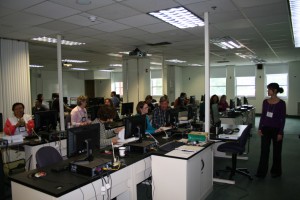
Over the course of DELTA’s twelfth Summer Institute, held from May 17 to May 21, 2010, in DH Hill Library, NCSU faculty members learned by participation: creating full-featured course websites using Moodle with graphics, syllabi, notes, quizzes, automated grading, discussion boards, databases, RSS feeds, student activity reports, and more, in just a few days.
For over a decade, DELTA has hosted the Summer Institute for faculty to learn, in a unified manner, about instructional technology tools and techniques that can be used to support teaching and learning at NC State. Due to demanding schedules, many faculty members do not have the time to stay updated on emerging educational technologies, especially during the regular academic year.
“[I signed up for Summer Institute] because I needed to learn how to better engage students with my course, said Dr. Consuelo Arellano, a statistics research assistant professor. “It’s really important to offer them more than just a lecture, and there’s a way for them to participate in the class in different environments – online, at home, through video – there are so many options now, and [faculty members] don’t normally pay attention to those.”
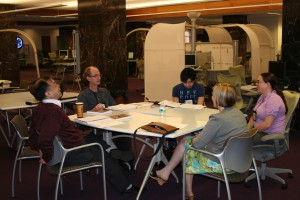
DELTA divided the Summer Institute participants into two cohorts, one in the morning and one in the afternoon, grouping together faculty members in the same or similar departments, as well as assigning each faculty member a DELTA “buddy” as a point of contact for any questions or feedback.
“The cohort of learners supported by our DELTA buddy is a great design,” said John Pritchett, College of Education professor and Master of Arts in Teaching (MAT) program coordinator for Math, Science, & Technology Education. “I got the chance to network with faculty from my own department as well as other colleges.”
Hosting Course Content in Moodle
For each cohort, DELTA hosted sessions with instructors and rovers (who give one-on-one assistance to faculty members in need) in the DH Hill Library’s ITTC labs, helping faculty members implement Moodle to enhance their courses for them and their students.
Moodle, part of the emerging WolfWare toolset, is a Learning Management System (LMS) that is used for delivering NCSU Distance Education (DE) courses, and for supporting on-campus courses that wish to use web-based tools. It is an easy-to-use website creation tool that allows professors to create and post course content online with only a few clicks.
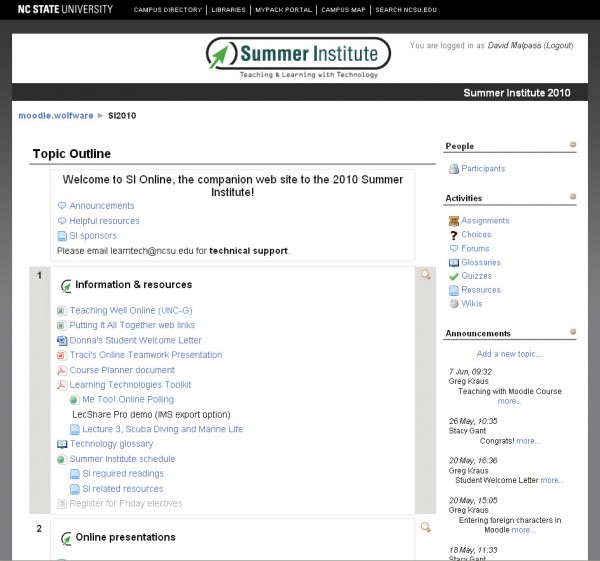
Associate Director of Faculty Development & Support Services Stacy Gant, who has been involved in Summer Institute for a decade, notes changes in technology from earlier Summer Institutes:
“In the past, we were much more involved in teaching skills such as website and graphics development when more technical skills were necessary to develop and teach a blended or online course. Now there are wizards and Learning Management Systems (LMSs) like Moodle that have those features built in so you no longer have to learn more difficult programs like Dreamweaver to create a course website.”
At least two attendees, Pritchett and English Professor Chris Salerno, found Moodle so easy to use that they have already implemented Moodle for their summer session courses which started just three days after Summer Institute ended:
“I was able to get the Moodle basics this week and I’m going to use it on Monday, and then more fully in the fall. I’m definitely going to use it for my syllabus and discussion boards for students, things that I’ve never had before,” Salerno said.
Pritchett has taken advantage of other Moodle features:
“I have already re-structured the course presentation to avoid the ‘scroll of death’. Each class session agenda for my face-to-face class is in [an individual] book [in Moodle] … This allows us to focus more easily on one session at a time,” Pritchett said. “My students are also developing a database of math education tools in Moodle.”
DELTA even turned faculty members into online students by enrolling participants in a special Summer Institute Moodle course – allowing faculty members to get a feeling for what it will be like for their students. The “homework” assignments allowed the faculty to take online quizzes, post introductions on a discussion board, and they were given prompt feedback and grades!
“We asked faculty members to introduce and share an interesting fact about themselves on a discussion forum, since that’s a very successful strategy to break the ice in a course and help folks feel a sense of connection and community,” Gant said. “We also asked them to view and add to a wiki, listing all their biggest concerns about using technology with teaching.”
The Summer Institute Moodle course page is available indefinitely, and can be used in the future for faculty to share ideas, ask a question, or review previous instruction and discussion.
“Using Moodle for your course, whether on campus or online, can have instructional and practical benefits,” Gant said. “Throughout the Institute, we discuss these benefits with our Summer Institute participants and show concrete examples of using online tools to ease administrative tasks, enhance communication between students and better engage students with material.” Gant explained that it’s important to keep learning objectives in the forefront when implementing new technologies or else it’s easy to be distracted by “bells and whistles.”
Selecting and Implementing Appropriate Learning Technologies
Although all faculty members participated in creating a unique course website in Moodle for their blended or DE course, they also learned appropriate techniques for teaching with technology, as well as about an array of other emerging technologies that may be appropriate for their course.
Tuesday, participants learned about LecShare Pro and Mediasite. On Wednesday night, Gant and Instructional Technologist Beth Shepherd held an online “office hour,” allowing participants to ask questions about what they had been learning, while at the same time, get hands-on practice with Elluminate Live! by participating from home.
Elluminate Live! is a rich media tool commonly used for synchronous class sessions, group meetings, or presentations. Instructors can host virtual office hours with live audio, video, and text, as well as other supplemental interactive features like quizzing and polling.
“We had 13 faculty members attend–signing in from all over the Triangle – for the online session. There were faculty members in their pajamas experiencing this interactive environment and practicing some of the teacher skills that you need to have to effectively run an Elluminate Live! session,” Gant said.
Friday’s schedule was different from the first part of the week. Summer Institute participants were given the
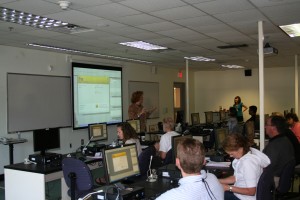
opportunity to choose from twelve 50-minute electives held throughout the day, including: “Creating Narrated Presentations,” “Creating a Course Welcome Video,” “Students Have ‘Gone Google,’ What Does That Mean For Me?” and “Teaching Math and Science with WebAssign.”
In addition to the electives, participants were given the opportunity to attend an Open Lab available throughout the day, where participants could work one-on-one with DELTA support staff on specific tasks.
“We had experienced DELTA staff present for each open lab session: we had an Instructional Technology specialist, an Instructional Designer, and a Multimedia expert,” Gant said. “Summer Institute doesn’t always appear to be a DELTA-wide program since you see the training staff most often – but it very much is, in terms of the people that support it and work with faculty afterwards.”
In fact, during lunches on Monday, Wednesday, and Friday, employees throughout DELTA’s many departments, previous Summer Institute participants, and faculty members who had previously worked with DELTA, provided information and support for Summer Institute participants.
Dr. Anna Howard, a 2010 Gertrude Cox Award for Innovative Excellence in Teaching & Learning with Technology winner and a teaching assistant professor in Engineering, gave a presentation on the Large Course Redesign (LCR) project she has worked on with DELTA for MAE 206: Engineering Statics.
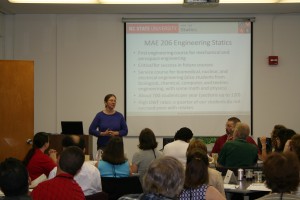
Participants said about Howard’s presentation:
“It was fascinating – very informative and engaging – the direct specific examples of technology implementation were excellent.”
“It helped me reflect and perceive differently my perspective that if I put all of my content online, students won’t feel the need to come to class. I … see that I can do what I want [in my course] more efficiently while providing and motivating my students to learn.”
Faculty members were also given a copy of the Learning Technologies Toolkit that lists all of the learning technologies available on campus. It is a launching pad to connect them with resources available on campus. The toolkit explains what the various technologies are, how faculty members might use that technology effectively in their course, and key support contacts to go to for help.
Although DELTA covered an array of emerging technologies, faculty members enjoyed the fast-paced overview.
“The immersion experience is an effective way to absorb a great deal of
information quickly. Plus, the DELTA team has very positive energy. You’ll
learn and laugh a lot, meet great people, be inspired, gain confidence to
try new things, and have plenty of enthusiastic support,” said English Lecturer Janet Hudson.
DELTA has encouraged faculty members to follow up by scheduling instructional house calls, calling the faculty help desk, and working with their assigned buddy, who can address any problems or issues or redirect them to the correct DELTA staff member.
DELTA offers support year-round for faculty whose interest has been sparked by something learned at Summer Institute or through other means. View the Summer Workshops brochure, register for a Summer Workshop, or contact LearnTech to learn more about using technology to enhance your course.


